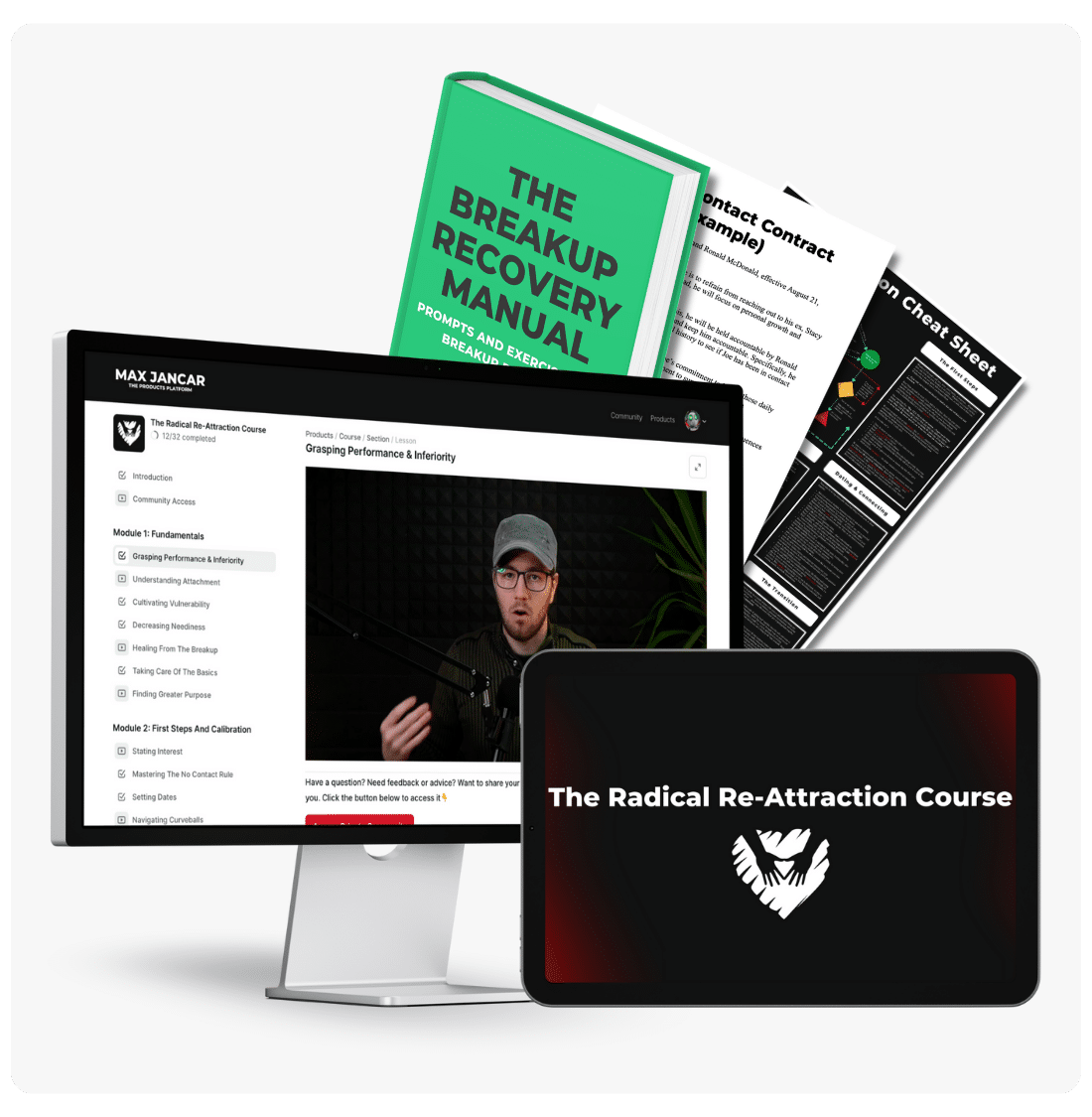Click play to listen to this article.
A healthy relationship with your ex (or anyone) requires several critical elements: efficient communication, sturdy boundaries, solid compatibility, a sound understanding of love, attachment styles, and — most importantly — mutual respect, trust, and affection.
It’s these last three elements — respect, trust, and affection — that ultimately determine what kind of a relationship you had and whether getting back with your ex will lead to something sustainable or just another painful breakup cycle.
Below, I’ll help you honestly assess whether these elements existed in your dead relationship, and provide practical ways to develop them if you’re attempting reconciliation.
A no-nonsense guide for thoughtful people who want reconciliation without manipulation, games, or fake behavior — just authentic growth and deep psychological understanding.
Order Your CopyTrust
To trust your ex means you firmly believe in their integrity, ability, or character. It’s when you take them at their word. It’s when you assume that if they told you they’d do something, they’ll go out and do it.
Trust between two people develops over time through numerous accumulations of connection-focused interactions between them. Or as the famous marriage counselor John Gottman wrote:
Trust is built in very small moments, which I call ‘sliding door’ moments. In any interaction, there is a possibility of connecting with your partner or turning away from your partner. One such moment is not important, but if you’re always choosing to turn away, then trust erodes in a relationship- very gradually, very slowly.
In practical terms, trust develops when you have an honest and vulnerable conversation with your ex, when you’re showing mutual devotion, affection, or admiration, or when you’re meeting each other’s emotional needs.
Trust will also occasionally fluctuate depending on what your ex’s behaviors sub-communicate. For example, when they make a questionable decision that harms your bond, your trust in them lowers. But when they make a decision that supports and inspires your relationship, your trust in them rises.
Nevertheless, there are also attachment types that you must consider in trust fluctuations. For example, if you have an insecure attachment type, like anxious or avoidant, you’ll have challenges trusting your ex regardless of what their behavior sub-communicates.
This cheat sheet lays out a simple yet potent approach to mending a relationship — one rooted in raw authenticity that respects both your dignity and that of your ex.
Get The Free Cheat SheetRespect
To respect your ex means that you hold them in high esteem. You’re don’t look down upon them and are proud of who they are, what they’ve achieved, what activities they’ve thrown themselves in, and the values they’ve adopted.
Respect also acts as a cushion for conflicts that will inevitably turn up regardless of how good of a communicator you are. It will help you focus that you’re a team and should always turn toward each other, not away, in times of pain and struggle.
If you fail to respect your ex, you will begin to doubt their intentions, judge their choices, and encroach on their independence. You’ll also feel like you need to hide certain things from them and fear being vulnerable and hearing their criticisms or backlash.
Now, to respect your ex, you must first respect yourself. If you fail to do it, you will not only feel lesser compared to them, you won’t even begin to believe nor accept when they’re respecting you and will always find ways to sabotage your relationship.
For example, when your ex tells you how great you’re in bed, you’d shrug your shoulders and think, “That’s such a lie. I’m horrible in bed. How can they think I’m great. They probably want something from me or feel bad about something they said earlier.”
Affection
Being affectionate towards your ex translates to many small behaviors. It could be when you’re:
- Giving them a back rub.
- Cooking a tasty meal for them.
- Going out on a date with them.
- Telling them how much you love and care about them.
- Kissing them when you stopped at a red light.
- Kissing them goodbye when going to work.
- Sending them heart emojis via text.
- Thanking them for the great meal.
- Sitting down and listening to what they have to say (even when it comes to trivial subjects).
- Holding their hand while having a stroll.
The cool thing about these little gestures of affection is that they add up over time and keep deepening the bond between you and your ex, and raising mutual respect and trust.
The only times a couple will have difficulties giving or receiving affection are when a) their relationship is toxic (devoid of trust and respect) or b) one or both of them still carries unresolved trauma. Maybe they weren’t cuddled enough when they were a kid. Maybe they were neglected, ignored, shunned too often. Maybe they never knew their parents. There are a million and one places where one can absorb some degree of trauma.
But, But, But… What About Love?
An online course that teaches you how to permanently get back with your ex through honesty, vulnerability, and proper self-improvement.
Get Instant AccessNotice how love is not the core component of a healthy relationship. Most people are shocked when they find this out, but the truth is, if your relationship is primarily built on love, you’re in for a world of hurt.
Let’s say that your ex cheated on you with your best friend. Now you probably value loyalty to some degree, but you value love way more. So in the name of love, you will give your ex one more chance, and after they cheat on you again next week, you provide them with yet another one. Then the cycle keeps repeating over and over and over.
Each time you give your ex another chance to rekindle things, you lose more of their trust and respect. But hey, you still love them, so you stay stuck in a toxic relationship and think that if you just keep loving them, their behavior will change someday. But since you’ve conditioned them that treating you like shit is okay, it never does.
So each time you let them get away with cheating, they lose a shard of respect for you, and you lose a shard of trust for them. Fast forward a couple of weeks of the same treatment, and you basically don’t have a relationship anymore.
The solution? Don’t base your entire relationship on love and put healthier values on top of it — values like respect, trust, honesty, integrity, humility, or empathy. Likewise, don’t build unrealistic outlooks and expectations around love, sacrifice your wants, desires, and needs for it, and always remember that it doesn’t fix every relationship problem nor does it signal compatibility.
Love is merely a side product of mutual trust, respect, and affection between two people. And when love is the side product, it also tends to be unconditional — love given without attachments to the outcome. Think of it as a form of mature and healthy love. This is the type of love you should aim to give and receive.
Final Thoughts
When a relationship includes two healthy, compatible, and secure individuals who are in it for the right reasons, know how to love the right way, and can tolerate each other’s flaws, a strong sense of mutual trust, respect, and affection will naturally develop. Thus, they end up forming a healthy relationship.
But, if a relationship includes two emotionally unstable, incompatible, and insecure people with all sorts of hidden, unprocessed traumas, mutual trust, respect, and affection probably won’t ever develop. Thus, they end up forming a toxic relationship.
Many people wonder if there’s a chance to turn a toxic relationship into a healthy one. My answer: it depends. It is possible, but is it worth it? Usually not. But that’s for you to decide.
This cheat sheet lays out a simple yet potent approach to mending a relationship — one rooted in raw authenticity that respects both your dignity and that of your ex.
Get The Free Cheat SheetRelated Reading
- 5 Signs Your Ex Is Not Worth Getting Back Together With November 9, 2024
- Know When To Stop December 23, 2023
- 24 Striking Signs Your Ex Will Never Come Back October 18, 2025
- The Do’s And Don’ts Of Being Friends With An Ex June 24, 2021
- A Definitive Guide To Going No Contact With A Fearful-Avoidant Ex April 7, 2021
- Covert Contracts: Subtle Saboteurs Of Re-Attraction March 30, 2022



